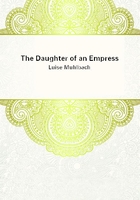
第33章 THE COURT BALL(2)
These were the dangerous rocks between which this proud and elegant assemblage had to find their winding way, and they did it with smiles and outward ease, with open admiration of both princesses, before whom they bowed to the ground with slavish submission.
But suddenly something like a panic-terror, like an unnatural awe, flew through all these splendid halls; the smiles were arrested on all faces, the harmless jests on all lips; the pallor of beautiful women became visible through their paint, and generals staggered to and fro as if a thunderbolt had fallen. As if touched by a magic wand, every one stood motionless like statues modelled in clay, no one daring to speak to his neighbor or make a sign to a friend. They would not see, they would not hear, they only wished to seem to be indifferent and unobserving.
As we said, a panic-terror pervaded the halls, and like an evil-announcing night-spectre passed over the heads of the stiffened, lifeless crowd the dismal rumor--"The regent and the princess are at variance; the regent is speaking to her with vehemence, and the princess weeps!"This certainly was a terrible announcement. But if the regent was angry, it must be because she knew of the intrigues and machinations of the princess, and knowing them she could counteract and nullify them; consequently the plans of the princess were upset, Anna Leopoldowna would remain ruler, and her son Ivan the Czar of all the Russias.
Now the touch, the vicinity of Elizabeth's friends became an evil-breathing pest, a death-bringing terror; they anxiously avoided the vicinity of Lestocq, they crowded back from Woronzow and Razumovsky, whom they had before sought with every demonstration of friendliness;they even avoided looking at the French ambassador; for, if the regent knew all, she must know of the intimate relations of Lestocq with the Marquis de la Chetardie, and he was therefore doomed like the other three.
And moreover, this pernicious rumor had not lied; the two princesses were at this moment no longer so tender and friendly disposed as shortly before.
They had long wandered through the halls, confidingly chatting and smiling, and Anna, leaning upon Elizabeth's arm--Anna who this day saw every thing /couleur de rose/--felt a sort of disquiet that people should suspect her who was walking by her side with such innocent candor and unconstraint, seeming not to have the least presentiment of the dark cloud gathering over her head.
"She is inconsiderate," thought the regent; "she allows herself to be carried away by her temperament, and behind her inclination and her weakness for handsome grenadiers and soldiers, her enemies seek to discover an insidious and well-considered conspiracy; this is cruel and unjust! This good Elizabeth must be warned, that she may become more cautious, and give her numerous enemies no occasion for suspecting her. Poor innocent child, so gay and ingenuous, she plays with roses under which serpents lie concealed! It is my duty to warn her, and I will."Wholly penetrated with this noble and generous resolution, the regent drew her cousin Elizabeth into the little boudoir which lay at the end of the hall, offering a convenient resting-place for a confidential conversation.
But at this moment Anna's eyes fell upon the lace mantelet of the princess, and quite involuntarily came to her mind the warning words of Ostermann, who had said to her: "The French ambassador, by command of his government, provides the princess not only with money, but also with the newest modes and most costly stuffs." This lace mantelet could surely only come from Paris; nothing similar to it had been seen in St. Petersburg; it certainly required especial sources and especial means for the procurement of such a rare and magnificent exemplar.
A cloud drew over the regent's brow, and in a rather sharp and cutting tone she said; "One question, princess! How came you by this admirable lace veil, the like of which I have not seen here in St. Petersburg?"While putting this question, the regent's eyes were fixed with a piercing, interrogating expression upon the face of the princess: she wished to observe the slightest shrinking, the least movement of her features.
But Elizabeth was prepared for the question; she had already considered her answer with the marquis and Lestocq. Her features therefore betrayed not the least disturbance or disquiet; raising her bright and childlike eyes, she said, with an unconstrained smile: "You wonder, do you not, how I came by this costly ornament? Ah, I have for the last eight days rejoiced in the expectation of surprising you to-day with the sight of it!""But you have not yet told me whence you have these costly laces?"asked the regent in a sharper tone.
"It is a wager I have won of the good Marquis de la Chetardie," said Elizabeth, without embarrassment, "and your highness must confess that this French ambassador has paid his wager with much taste."The regent had constantly become more serious and gloomy. A dark, fatal suspicion for a moment overclouded her soul, and in her usually unsuspicious mind arose the questions: "What if Ostermann was right, if Elizabeth is really conspiring, and the French ambassador is her confederate?""And what, if one may ask, was the subject of the wager?" she asked, with the tone of an inquisitor.